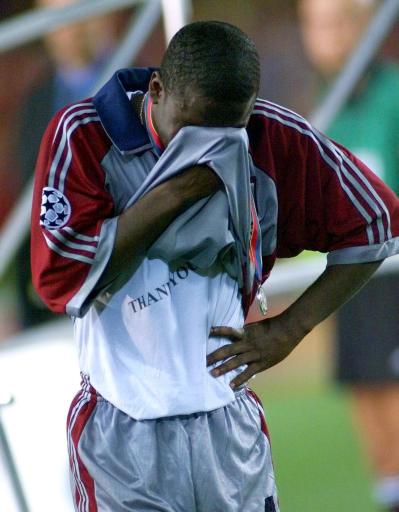"IT IS hard to find the right words," said Franz Beckenbauer, president of Bayern Munich and three times a winner of the European Cup. "But I will try. It is a game, was a game and will always be a game. We have not lost a battle, nor a war; nobody has lost their lives. We have lost a game." He praised Bayern's performances in winning the Bundesliga and reaching the final of the Champions League against the odds.
His audience listened, too, even if they did not quite hear. The events of which he spoke were still beyond their understanding. The audience were his players. Beckenbauer's speech to Lothar Matthäus, Stefan Effenberg and company was published, under his own byline, in Friday's edition of Die Welt. Top to bottom, president to playmaker, Bayern are apparently baring their tortured soul, as if to do so might somehow act as therapy.
The images will be remembered long after Beckenbauer's words: the sight of the 6ft 4in obelisk, Carsten Jancker, in unquenchable tears, crawling on all fours on the Nou Camp pitch; Samuel Kuffour, the Christian from Ghana, having to be helped, like a mourner at a funeral, to collect his loser's medal.
There had been gestures of anger, too: Thomas Helmer, who was kept on the bench, showed his feelings over the substitutions made by his manager, Ottmar Hitzfeld. Helmer called it a scandal. "You see," he told reporters, "how God punishes errors like that with the substitutions. If you take Lothar off, you need a strong man to come on in his place." If nothing else, Matthäus's sentry duty at the goalpost for cornerkicks had been missed.

After the ceremony, the 38-year-old Matthäus's silver medal hung around his neck for . . . well, less time than it takes Teddy Sheringham to score in a cup final. Hitzfeld had praised Matthäus's 80 minutes, but others have found a parable in his departure from the field. Mehmet Scholl is quoted as having said, after the match: "He [Matthäus] always goes off when it gets tight." Helmer and Scholl have been fined.
Yet Beckenbauer would be the first to acknowledge that Bayern's employees have seldom been tight-lipped. It is Hitzfeld's achievement to have created from their idiosyncratic personnel a strong unit, managing a squad so successful that it, too, was competing for a treble until the 90th minute against United. The differences between the circumstances of the clubs going into the game are worth reflection. Bayern won their domestic championship at a canter; United's went right to the wire. Nor did Hitzfeld's team carry the momentum of a fresh cup final triumph into Wednesday; they contest the German knock-out final in two weeks. Pity Werder Bremen when they feel the Bavarian backlash.
A thought might be spared for Moldova, too. Up to seven of the Bayern squad in Barcelona will be in the German national party who resume their wobbly defence of the European championship next weekend, although Erich Ribbeck, Germany's coach, has so far been unable to recreate Hitzfeld's formula with most of the same players, and he was initially fearful of the effect such a setback would have on the minds of his players. If the club-country link has been particularly cherished by some of Wednesday's victors, it is because of a long history of German superiority, and a recent bitter experience. Scholl, Oliver Kahn, Markus Babbel and Mario Basler were at Euro 96, in the party which progressed on penalties to the final at the expense of an England squad including Gary Neville and Sheringham. Terry Venables, the England manager at the time, said he couldn't stop laughing when United's second goal went in.
If Euro 96 had extended the lease on German football's sense of its enduring quality, so had Bayern's achievements this season. But their defeat has opened a few familiar drawers in the archive of German newspapers, the ones which offer evidence that the German game, after successive quarter-final exits at the last two World Cups, is not keeping pace.
Economically, only Bayern among German clubs can hope to compete with Europe's super-rich half-dozen, although to follow financial logic too rigidly is to forget that Hitzfeld took one or two ageing players to victory in the European Cup with Borussia Dortmund two years ago. Beckenbauer's speech to the players on Wednesday night singled out Hitzfeld's contribution to Bayern's "new beginning", albeit on old legs.
"The opportunities for next season and next year lie before us," he added. Bayern will be back next season, as Bundesliga title-holders, to join Milan, Barcelona and United in the crowded arena of an expanded Champions League. Hitzfeld echoed Alex Ferguson, when he said the next European Cup will be harder to win than this one, although the field may be a little more open than once suspected. There is no Juventus, no Internazionale, no Ajax, no Dortmund; but there is an amazing finale to live up to when the hopefuls take their starting positions in September.



